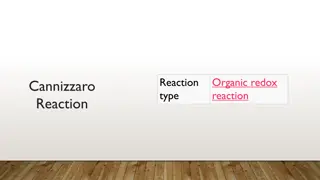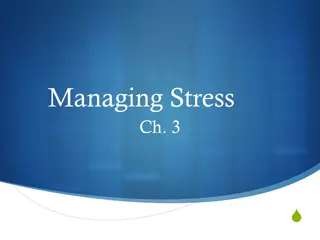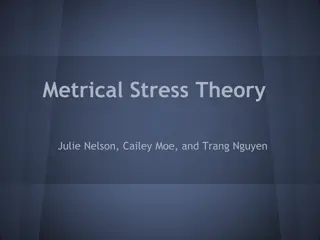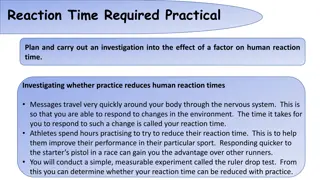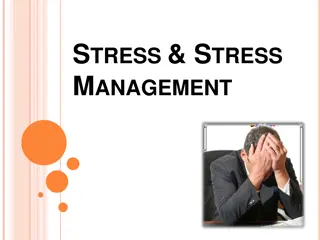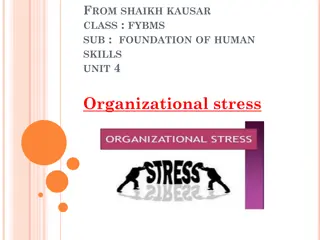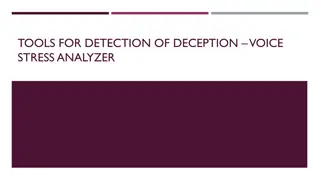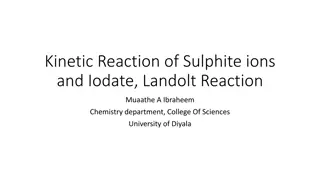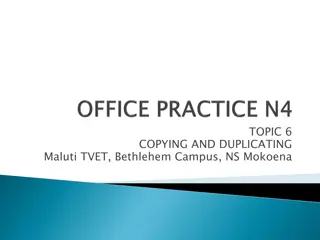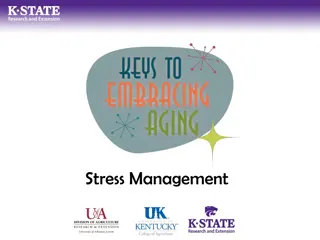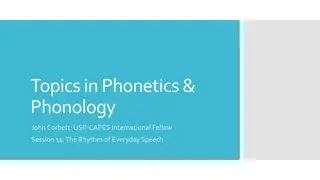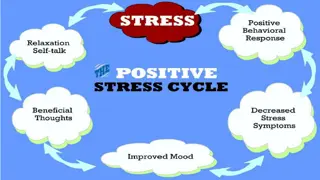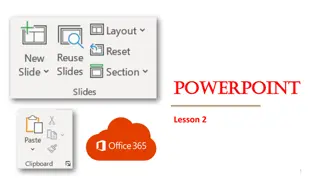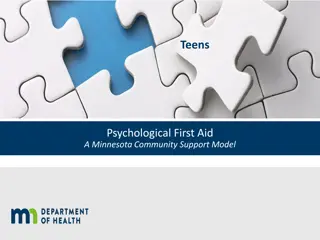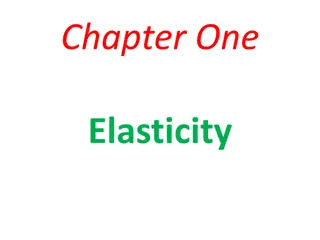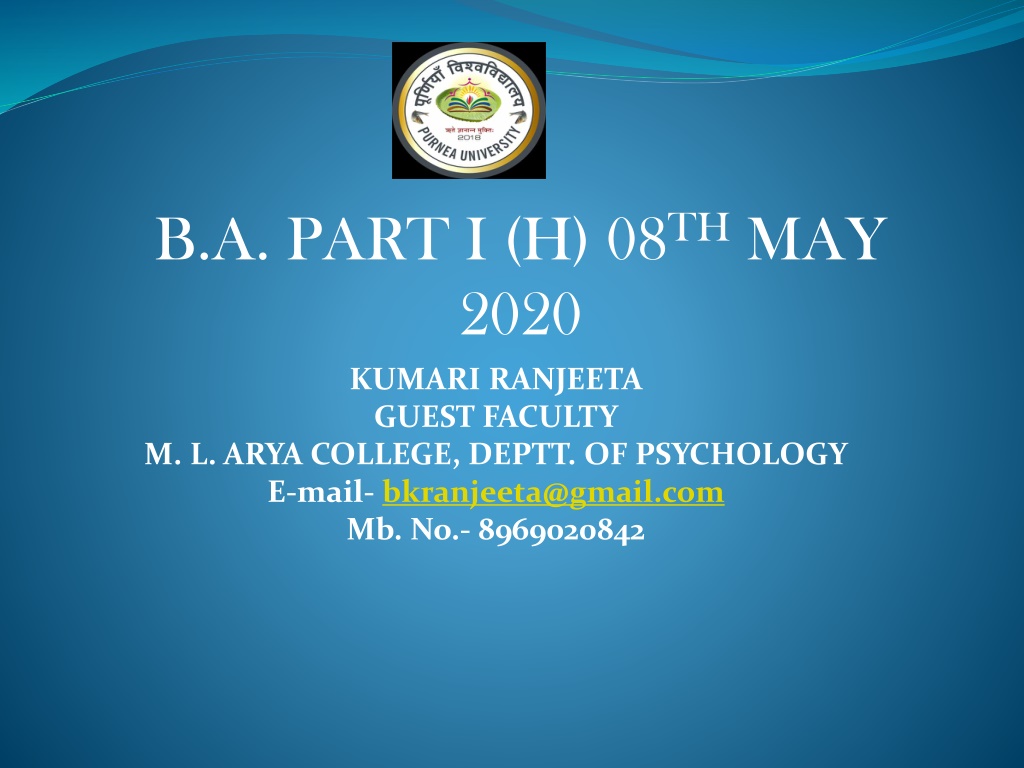
Managing Stress: Coping Strategies and Techniques
Discover effective coping strategies for dealing with stress, including task-oriented, emotion-oriented, and avoidance-oriented approaches. Learn how to regulate emotions, seek social support, and apply stress relief techniques to enhance well-being and resilience in challenging situations. Explore the distinction between problem-focused and emotion-focused coping techniques and their impact on stress management.
Download Presentation

Please find below an Image/Link to download the presentation.
The content on the website is provided AS IS for your information and personal use only. It may not be sold, licensed, or shared on other websites without obtaining consent from the author. If you encounter any issues during the download, it is possible that the publisher has removed the file from their server.
You are allowed to download the files provided on this website for personal or commercial use, subject to the condition that they are used lawfully. All files are the property of their respective owners.
The content on the website is provided AS IS for your information and personal use only. It may not be sold, licensed, or shared on other websites without obtaining consent from the author.
E N D
Presentation Transcript
B.A. PART I (H) 08TH MAY 2020 KUMARI RANJEETA GUEST FACULTY M. L. ARYA COLLEGE, DEPTT. OF PSYCHOLOGY E-mail- bkranjeeta@gmail.com Mb. No.- 8969020842
08 MAY 2020 B.A. PART I (H) PAPER III, UNIT II (STRESS PROBLEM OF ADJUSTMENT) COPYING WITH STRESS: TASK ORIENTED REACTION Stress leads to persistent efforts by an individual to cope with it. Coping is thus a response to stress. Physical and environmental demands causing stressful taxation on person s resources are varied in nature. Besides personality factors, ability to cope with stress distinguishes one person from another. Lazarus (1998)defined coping as constantly changing cognitive and behavioral efforts to manage specific external or internal demands that are appraised as taxing or exceeding resources of a person .
08 MAY 2020 B.A. PART I (H) PAPER III, UNIT II (STRESS PROBLEM OF ADJUSTMENT) Task-oriented coping consists of efforts aimed at solving the problem. Emotion-oriented coping involves emotional reactions; and avoidance- oriented coping involves activities and cognitions aimed at avoiding the stressful situation and can be of a distraction or social diversion nature. One can also conceptualize and investigate coping in terms of how individuals respond to specific stressful situations, such as coping with an illness.
08 MAY 2020 B.A. PART I (H) PAPER III, UNIT II (STRESS PROBLEM OF ADJUSTMENT) Emotion-oriented coping According to Richard S. Lazarusand Susan Folkman emotion focused copying is a stress- management strategy in which a person focuses on regulating his or her negative emotional reactions to a stressor. Rather than taking actions to change the stressor itself, the individual tries to control feelings using a variety of cognitive and behavioral tools, including meditation and other relaxation techniques, prayer, positive reframing, professionals).
08 MAY 2020 B.A. PART I (H) PAPER III, UNIT II (STRESS PROBLEM OF ADJUSTMENT) wishful thinking and other avoidance techniques, self- blame, seeking social support (or conversely engaging in social withdrawal), and talking with others including mental health care. It has been proposed that emotion-focused coping is used primarily when a person appraises a stressor as beyond his or her capacity to change. 5 Emotion-Focused Coping Techniques for Stress Relief: Stress management techniques can fall into two categories:
08 MAY 2020 B.A. PART I (H) PAPER III, UNIT II (STRESS PROBLEM OF ADJUSTMENT) problem-focused coping and emotion-focused coping. Basically speaking, problem-focused (or solution- focused) coping strategies aim to eliminate sources of stress or work with the stressors themselves, while emotion-focused coping techniques aid you in becoming less emotionally reactive to the stressors you face, or altering the way you experience these situations so they impact you differently. Emotion-focused coping focuses on regulating negative emotional reactions to stress such as anxiety, fear, sadness, and anger.
08 MAY 2020 B.A. PART I (H) PAPER III, UNIT II (STRESS PROBLEM OF ADJUSTMENT) This type of coping may be useful when a stressor is something that you cannot change. Benefits This is part of why emotion-focused coping can be quite valuable shifting how we experience potential stressors in our lives can reduce their negative impact. With emotion- focused coping, we don't need to wait for our lives to change, or work on changing the inevitable we can simply find ways to accept what we face right now, and not let it bother us. This can cut down on chronic stress, as it gives the body a chance to recover from what might otherwise be too-high levels of stress.
08 MAY 2020 B.A. PART I (H) PAPER III, UNIT II (STRESS PROBLEM OF ADJUSTMENT) Another advantage of emotion-focused coping is that it allows us to think more clearly and access solutions that may not be available if we are feeling overwhelmed. Because stressed people do not always make the most effective decisions, emotion-focused coping can be a strategy to get into a better frame of mind before working on problem-focused techniques. In this way, emotion-focused coping can help with both emotions and solutions. And the two types of copying strategieswork well together in this way.
08 MAY 2020 B.A. PART I (H) PAPER III, UNIT II (STRESS PROBLEM OF ADJUSTMENT) Because stressed people do not always make the most effective decisions, emotion-focused coping can be a strategy to get into a better frame of mind before working on problem-focused techniques. In this way, emotion- focused coping can help with both emotions and solutions. And the two types of copying strategies work well together in this way. While problem-focused strategies need to fit well with the specific stressors they are addressing, emotion-focused coping techniques work well with most stressors and need only fit the individual needs of the person using them.


